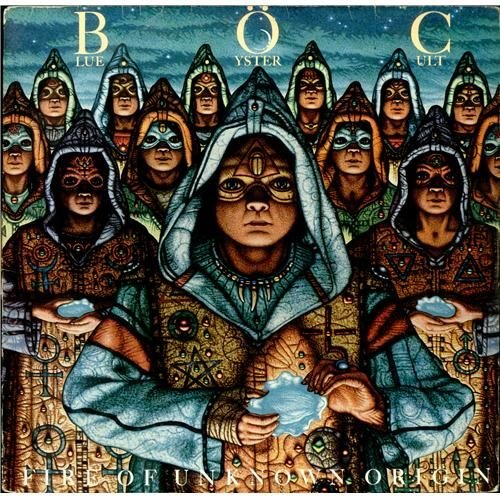lazarus
Blue Crack Supplier
I've spent about a month exploring a box set of this band's Columbia Records discography, and I'm very pleased with what I've heard. So I've created this in the hopes of sharing my findings with some of you.
When most Gen-Xers hear "Blue Öyster Cult", they're most likely to think of their two biggest radio hits "Don't Fear The Reaper" and "Burning For You", and the subsequent generation probably recalls the famous "More cowbell!" skit from Saturday Night Live that poked fun at the recording of the former track. But in their initial 15-year run as recording artists, BÖC covered an impressive amount of musical terrain, and in a perfect world would have found "crossover" chart success with a good number of songs. Making their reputation more as a ferocious live act, the band's studio albums never seemed to receive the proper promotion from Columbia Records that would have achieved this goal. Regardless, the band did go on to sell 20+ million albums worldwide and influence many later acts.
Classified (incorrectly) as "heavy metal" for much of their career, the band's origins suggest a geekier version of the history behind The Velvet Underground or Sex Pistols: music critic and aspiring promoter Sandy Pearlman collected together a group of young musicians, and along with fellow critic Richard Metzler contributed lyrics to most of the band's songs for the first few years. In Pearlman's case, most of his writing came from The Soft Doctrines of Imaginos, his collection of poetry and script excerpts from a long-gestating project that blended Lovecraftian horror, science fiction, and a secret world history spanning centuries. A young Patti Smith (girlfriend of Cult keyboardist Allen Lanier) also lent her poetry to the band's songs, a collaboration that would last for over ten years. And while the band may have been the brainchild of Pearlman, all five members contributed to the songwriting process on almost every album, with four of them contributing lead vocals at one time or another. Musically, the early days of BÖC draw comparisons to harder acts like Black Sabbath and Steppenwolf, but also psychedelic bands like early Pink Floyd and Grateful Dead.
As the 1970s continued, the band drifted increasingly further from the obscure subject matter of their mentors, and branched out musically as well. While continuing to prove their hard rock chops (often seeming to parody the metal genre while doing so), one can hear the classic influences of Phil Spector and Frankie Valli, and contemporaries like The Cars and Steely Dan. Their peak of popularity came with the platinum-selling 1975's Agents Of Fortune, which featured the aforementioned Top 20 hit Reaper. As the band attempted to embrace pop in its various forms more fully, their fanbase objected with lower album sales even while their live shows still drew bigger and bigger crowds, and three live albums were released in less than a decade.
The 1980s saw BÖC return to a heavier sound (while paradoxically using more synthesizers and horns on some tracks) and deeper genre writing, including collaborations with fantasy writers Michael Moorcock and Eric V. Lustbader. Martin Birch (producer of Deep Purple, Black Sabbath, and Iron Maiden albums) worked for the band on two releases. Lineup changes and a termination of their record contract eventually put the band on a ten-year hiatus between studio albums, but not before Pearlman essentially used the band members as session musicians to complete his Imaginos project, originally planned as a three-album rock opera. Recorded over a period of seven years, a mutated and condensed version was finally released in 1988, featuring contributions from former Doors member Robbie Krieger, metal guitarists Joe Satriani and Aldo Nova, lead vocals on some tracks from people never in the proper band, and a spoken introduction by Stephen King. Despite its troubled history, it stands out as one of the band's most consistent works in terms of quality, and serves to bring the band back full circle to its arcane beginnings.
When most Gen-Xers hear "Blue Öyster Cult", they're most likely to think of their two biggest radio hits "Don't Fear The Reaper" and "Burning For You", and the subsequent generation probably recalls the famous "More cowbell!" skit from Saturday Night Live that poked fun at the recording of the former track. But in their initial 15-year run as recording artists, BÖC covered an impressive amount of musical terrain, and in a perfect world would have found "crossover" chart success with a good number of songs. Making their reputation more as a ferocious live act, the band's studio albums never seemed to receive the proper promotion from Columbia Records that would have achieved this goal. Regardless, the band did go on to sell 20+ million albums worldwide and influence many later acts.
Classified (incorrectly) as "heavy metal" for much of their career, the band's origins suggest a geekier version of the history behind The Velvet Underground or Sex Pistols: music critic and aspiring promoter Sandy Pearlman collected together a group of young musicians, and along with fellow critic Richard Metzler contributed lyrics to most of the band's songs for the first few years. In Pearlman's case, most of his writing came from The Soft Doctrines of Imaginos, his collection of poetry and script excerpts from a long-gestating project that blended Lovecraftian horror, science fiction, and a secret world history spanning centuries. A young Patti Smith (girlfriend of Cult keyboardist Allen Lanier) also lent her poetry to the band's songs, a collaboration that would last for over ten years. And while the band may have been the brainchild of Pearlman, all five members contributed to the songwriting process on almost every album, with four of them contributing lead vocals at one time or another. Musically, the early days of BÖC draw comparisons to harder acts like Black Sabbath and Steppenwolf, but also psychedelic bands like early Pink Floyd and Grateful Dead.
As the 1970s continued, the band drifted increasingly further from the obscure subject matter of their mentors, and branched out musically as well. While continuing to prove their hard rock chops (often seeming to parody the metal genre while doing so), one can hear the classic influences of Phil Spector and Frankie Valli, and contemporaries like The Cars and Steely Dan. Their peak of popularity came with the platinum-selling 1975's Agents Of Fortune, which featured the aforementioned Top 20 hit Reaper. As the band attempted to embrace pop in its various forms more fully, their fanbase objected with lower album sales even while their live shows still drew bigger and bigger crowds, and three live albums were released in less than a decade.
The 1980s saw BÖC return to a heavier sound (while paradoxically using more synthesizers and horns on some tracks) and deeper genre writing, including collaborations with fantasy writers Michael Moorcock and Eric V. Lustbader. Martin Birch (producer of Deep Purple, Black Sabbath, and Iron Maiden albums) worked for the band on two releases. Lineup changes and a termination of their record contract eventually put the band on a ten-year hiatus between studio albums, but not before Pearlman essentially used the band members as session musicians to complete his Imaginos project, originally planned as a three-album rock opera. Recorded over a period of seven years, a mutated and condensed version was finally released in 1988, featuring contributions from former Doors member Robbie Krieger, metal guitarists Joe Satriani and Aldo Nova, lead vocals on some tracks from people never in the proper band, and a spoken introduction by Stephen King. Despite its troubled history, it stands out as one of the band's most consistent works in terms of quality, and serves to bring the band back full circle to its arcane beginnings.










 ) the zombie apocalypse that I really dig.
) the zombie apocalypse that I really dig. 
